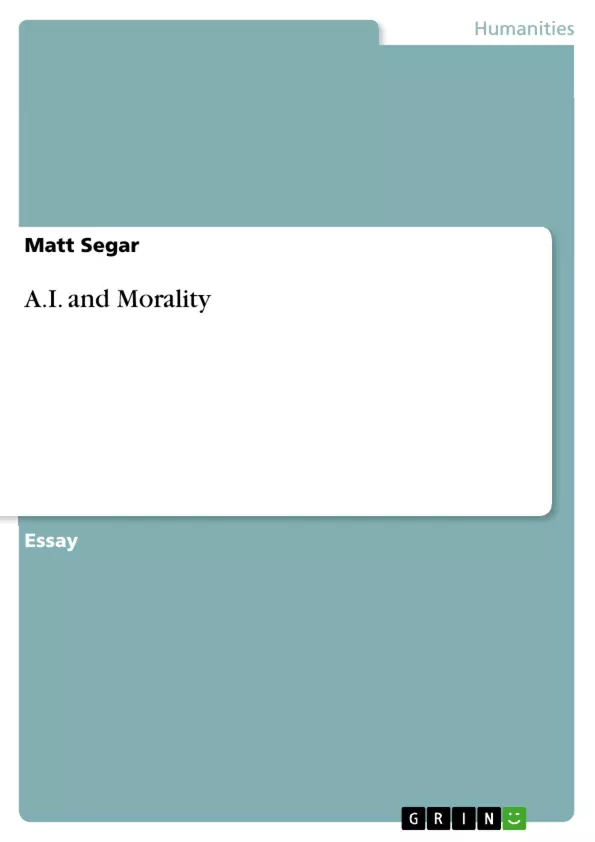Technology is advancing rapidly. In the not so distant future robots may be an integral part of daily life. Ever since the development of the computer, science fiction writers have described worlds in which machines live alongside humans. Coincidently, as technology progresses the ability to tell robots apart from humans could become difficult. Some may argue that robots should not be treated the same way as humans. However, as artificial beings start behaving as if they have minds they should be treated as if they were any other living being.
Inhaltsverzeichnis (Table of Contents)
- A.I. and Morality
- Artificial Intelligence
- Lycan's Argument
- Searle's Refutation
- Dennett's Response
Zielsetzung und Themenschwerpunkte (Objectives and Key Themes)
This text explores the philosophical and ethical implications of artificial intelligence (A.I.) and its potential impact on our understanding of consciousness, personhood, and morality. It examines the question of whether robots, capable of intelligent behavior and complex interactions, should be treated as humans.
- The nature of artificial intelligence and its potential for consciousness
- The ethical implications of treating robots as persons
- The role of syntax and semantics in understanding intelligence
- The relationship between physical embodiment and mental states
- The implications of A.I. for our understanding of human consciousness
Zusammenfassung der Kapitel (Chapter Summaries)
The text opens by introducing the rapid advancement of technology and the potential for robots to become an integral part of human life. It then defines artificial intelligence and explores the argument that robots, capable of intelligent behavior and complex interactions, should be considered to have minds.
Lycan's argument is presented, using the hypothetical robot "Harry," to demonstrate that a robot's ability to pass behavioral tests for mental states would suggest that it possesses thoughts and feelings. He argues that the robot's origin and chemical composition should not be used to deny its potential for mentality.
Searle's refutation challenges Lycan's view, asserting that computers operate purely on syntax, lacking the semantic meaning necessary for true understanding. He uses the Chinese room example to illustrate how a system can manipulate symbols without understanding their meaning.
Dennett, in response to Searle, argues that computers can have causal powers and that a sufficiently advanced computer could control a human body, demonstrating indistinguishable behavior from a normal human. He suggests that the concept of "mind" should be based on the functioning of a brain, rather than its origin or composition.
Schlüsselwörter (Keywords)
Artificial intelligence, consciousness, personhood, morality, syntax, semantics, Chinese room, causal powers, mental states, robots, humans, ethical implications.
Frequently Asked Questions
Should robots be treated as living beings?
The text explores the argument that as artificial beings start behaving as if they have minds, they should be treated with the same moral consideration as any other living being.
What is Lycan's argument regarding A.I.?
Lycan uses the hypothetical robot "Harry" to argue that if a robot passes behavioral tests for mental states, its origin or chemical composition should not be used to deny its consciousness.
What is Searle's "Chinese Room" experiment?
Searle uses this example to show that a system can manipulate symbols (syntax) perfectly without understanding their meaning (semantics), arguing that computers do not truly possess understanding.
How does Dennett respond to Searle?
Dennett suggests that mind should be defined by the functioning of a system. He argues that a sufficiently advanced computer could control a human body in a way indistinguishable from human behavior.
What is the difference between syntax and semantics in A.I.?
Syntax refers to the rules for manipulating symbols (which computers excel at), while semantics refers to the actual meaning or consciousness behind those symbols.
- Quote paper
- Matt Segar (Author), 2010, A.I. and Morality, Munich, GRIN Verlag, https://www.grin.com/document/210744



